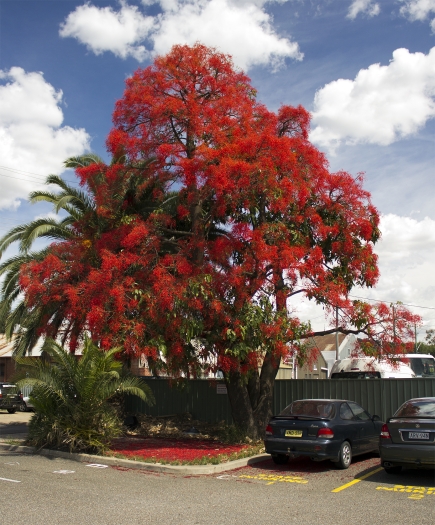Flame Tree
(Brachychiton acerifolius)
Flame Tree (Brachychiton acerifolius)
/
/

Bidgee
CC BY-SA 3.0 au
Image By:
Bidgee
Recorded By:
Copyright:
CC BY-SA 3.0 au
Copyright Notice:
Photo by: Bidgee | License Type: CC BY-SA 3.0 au | License URL: https://creativecommons.org/licenses/by-sa/3.0/au/deed.en | Uploader: Bidgee | Publisher: Wikimedia Commons | Title: Illawarra_Flame_Tree_(Brachychiton_acerifolius).jpg | Notes: Photo of ''[[Brahea armata]]'' (Mexican blue palm) Desert Demonstration Garden in [[Las Vegas]], taken March 2004 by [[User:Stan Shebs]] {{GFDL}} |
































Estimated Native Range
Summary
Brachychiton acerifolius, commonly known as the Flame Tree, is a deciduous or semi-deciduous tree native to the subtropical rainforests and moist forests of Eastern Australia. It can reach heights of 30 to 35 meters (98 to 115 feet) in its natural habitat but is typically shorter when cultivated. The Flame Tree is renowned for its striking appearance, with a pyramidal form and a display of bright red or scarlet bell-shaped flowers that are star-shaped when viewed from the end. These flowers, about 25 to 30 mm (0.98 to 1.18 inches) long by 16 to 22 mm (0.63 to 0.87 inches) wide, bloom on large panicles and are highly ornamental. Following flowering, the tree produces dark brown, leathery, boat-shaped pods approximately 10 cm (3.9 inches) long. These pods split open to reveal rows of yellow seeds encased in a papery aril with stiff hairs that can be irritating to the touch.
The Flame Tree is celebrated for its spectacular flowering event, which occurs after the tree sheds its leaves, covering the entire tree in masses of bright scarlet flowers. It is a popular choice for street plantings, public parks, gardens, and as a specimen tree in private gardens due to its ease of growth and low maintenance. The Flame Tree thrives in full sun and can adapt to a range of water conditions and soil types with varying drainage. While it is generally easy to grow, it may be propagated from seed, cuttings, or grafting. Gardeners should be cautious when handling the seed pods due to the irritating hairs.CC BY-SA 4.0
The Flame Tree is celebrated for its spectacular flowering event, which occurs after the tree sheds its leaves, covering the entire tree in masses of bright scarlet flowers. It is a popular choice for street plantings, public parks, gardens, and as a specimen tree in private gardens due to its ease of growth and low maintenance. The Flame Tree thrives in full sun and can adapt to a range of water conditions and soil types with varying drainage. While it is generally easy to grow, it may be propagated from seed, cuttings, or grafting. Gardeners should be cautious when handling the seed pods due to the irritating hairs.CC BY-SA 4.0
Plant Description
- Plant Type: Tree
- Height: 30-60 feet
- Width: 20-40 feet
- Growth Rate: Moderate
- Flower Color: Red
- Flowering Season: Spring, Summer
- Leaf Retention: Deciduous
Growth Requirements
- Sun: Full Sun
- Water: Medium
- Drainage: Fast, Medium, Slow
Common Uses
Bee Garden, Bird Garden, Butterfly Garden, Drought Tolerant, Hummingbird Garden, Low Maintenance, Showy Flowers, Street Planting
Natural Habitat
Subtropical rainforests and moist forests of Eastern Australia
Other Names
Common Names: Flame Bottletree , Illawarra Flame Tree , Lacebark Tree
Scientific Names: Brachychiton acerifolius , Sterculia acerifolia , Chichaea acerifolia , Brachychiton acerifolius var. typicus , Clompanus acerifolia
GBIF Accepted Name: Brachychiton acerifolius (A.Cunn. ex G.Don) F.Muell.